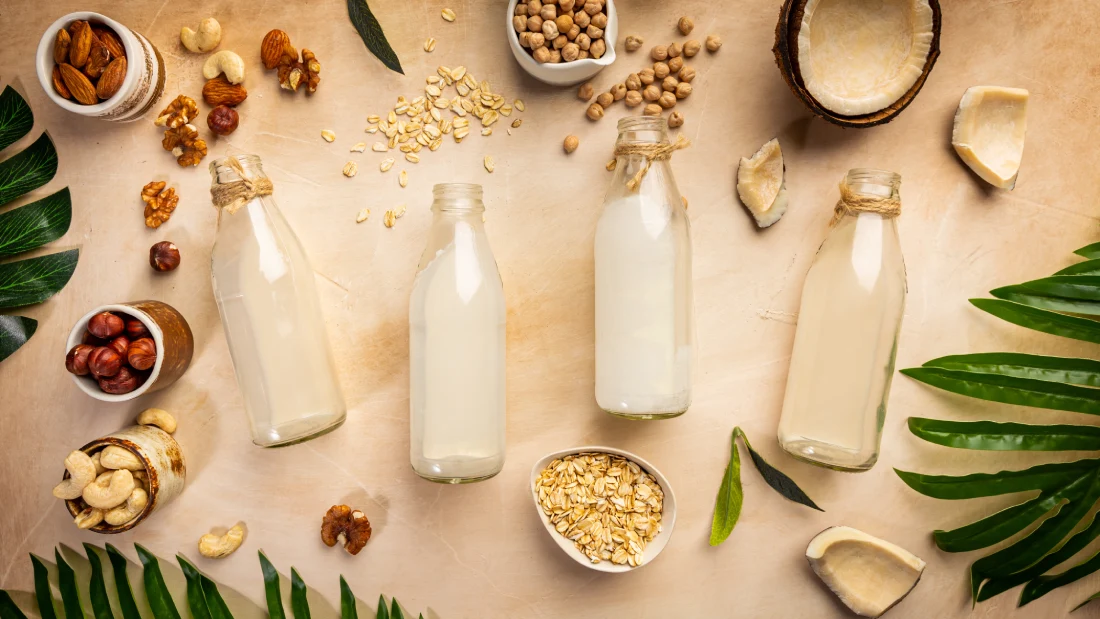8 plant milks with unique powers

The supermarket shelves are overflowing with plant-based milks these days. From our old familiar soya to oat to cashew milk, just to name a few. In fact, the dairy industry is so threatened by the burgeoning popularity of these cow’s milk alternatives that they won’t even let them be called “milk” on the packaging! With so much choice, how do you know which plant milk is right for you? Here we dig into the differences between some popular ones and examine the unique benefits of each.
1. Soya milk
Soya milk is a classic for a reason! It’s one of the most nutritious things you can drink. It’s good for bone health, can reduce the risk and recurrence of breast cancer, lower cholesterol and the risk of heart disease, ease menopausal symptoms and is a great source of protein, containing all nine essential amino acids. It also has higher amounts of phosphorus, selenium, zinc and magnesium than cow’s milk. Don’t let the scare stories about hormone disruption and ‘man boobs’ put you off – they are unfounded myths! The only reason to avoid soya is if you’re allergic to it. Another myth is that soya-eating vegans are to blame for deforestation, but most soya from the Amazon is grown for livestock feed.
2. Oat milk
Not only is oat milk many people’s top choice in coffee, it is also a source of beta glucans, a type of soluble fibre with heart health benefits. Heart disease is the leading cause of death worldwide so many people would benefit from consuming more beta glucans which have been shown to reduce cholesterol and high blood pressure. They also have prebiotic properties, which is good for our gut microbiome. Oat milk is one of the most environmentally friendly options – using very little water, land and with very low greenhouse gas emissions.
3. Almond milk
You might think that almond milk is a modern trend from the vegan cafés of sunny California but it actually dates back to the middle ages! In addition to its delicious flavour, almond milk’s main strength is its high content of vitamin E. Vitamin E is an important antioxidant and its main function is in protecting cell membranes from oxidation and damage. As such it helps to keep our organs – including blood vessels and eyes – functional and healthy and is essential for healthy skin and immune system. Although almond milk is often criticised for using a lot of water in its production, it still uses a lot less than cow’s milk and is one of the lowest for greenhouse gases emissions and land use.
4. Rice milk
Rice milk was one the earliest dairy alternatives to hit supermarket shelves after soya milk. It gained popularity because it is the least allergenic of the dairy-free milks. For those who can’t eat nuts, soya or gluten, rice milk is a great option. However, rice milk is high in carbohydrates – which can be good if you need some energy for a workout, but not if you’re trying to manage diabetes.
5. Hemp milk
Hemp isn’t just for hippies! In fact, it boasts one of the most impressive nutritional profiles of all plant-based milks. It is full of protein and healthy fats. Hemp contains good amounts of all nine essential amino acids and is particularly high in the amino acid arginine, which plays an important part in maintaining healthy blood pressure. It also contains an ideal ratio of omega-6 and omega-3 fatty acids, which keep our heart healthy. Hemp seed oil has also been shown to improve certain skin conditions, such as dermatitis, when consumed in the diet.
6. Cashew milk
As with all nuts, cashews are high in healthy fats, which are great for your heart. Creamy cashew milk contains the minerals magnesium and potassium which are also good for your heart and may also reduce the risk of stroke by an impressive 24 per cent. Cashews are also a good source of a couple of antioxidants important for eye health: lutein and zeaxanthin. Low levels of these antioxidants have been linked with poor eye health and those who had the highest levels of lutein and zeaxanthin in their blood were less likely to develop age-related vision loss and cataracts.
7. Pea milk
Pea milk might not yet be as common as soya, almond and oat, but it should be on everyone’s radar. Pea milk is packed full of protein and high in many other vitamins, minerals and essential nutrients. It contains all nine essential amino acids and its protein content is comparable to cow’s milk, without all the hidden nasties. It even beats cow’s milk in its magnesium, phosphorus, zinc and selenium content! Peas make the perfect plant milk and are set on supermarket shelf domination in the not-too-distant future.
8. Tiger nut milk
Tiger nuts are not actually nuts but edible tubers so you can think of them as tiny potatoes. They were first cultivated in Egypt and the Mediterranean region and are still used in Spain to make a tiger nut drink called Horchata de chufa. Although research on tiger nuts and its health benefits is still emerging, we know that they are a great source of fibre and flavonoids. Flavonoids have antioxidant, anti-carcinogenic, anti-inflammatory and anti-diabetic effects. And as if that wasn’t enough, they are also a source of good fats to keep your heart healthy.
With so many plant-based milks on offer, it’s a wonderful time to be vegan! Whatever your personal preferences, you’re sure to find an option to suit. Perhaps you like to mix it up with soya on your cereal, oat in your coffee and almond in your smoothies. Just remember, whichever plant milk tickles your taste buds, it’s best to stick to unsweetened varieties, fortified with calcium and vitamins D and B12.




